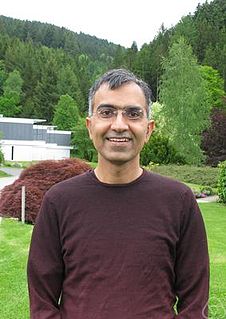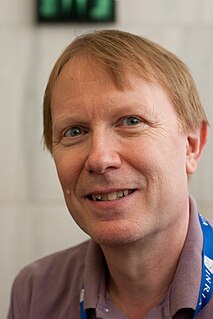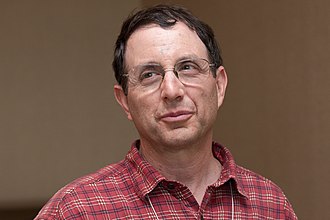
Stephen Arthur Cook, is an American-Canadian computer scientist and mathematician who has made major contributions to the fields of complexity theory and proof complexity. He is a university professor at the University of Toronto, Department of Computer Science and Department of Mathematics.

Solomon Feferman was an American philosopher and mathematician who worked in mathematical logic.
The Gödel Prize is an annual prize for outstanding papers in the area of theoretical computer science, given jointly by European Association for Theoretical Computer Science (EATCS) and the Association for Computing Machinery Special Interest Group on Algorithms and Computational Theory. The award is named in honor of Kurt Gödel. Gödel's connection to theoretical computer science is that he was the first to mention the "P versus NP" question, in a 1956 letter to John von Neumann in which Gödel asked whether a certain NP-complete problem could be solved in quadratic or linear time.
Johan Torkel Håstad is a Swedish theoretical computer scientist most known for his work on computational complexity theory. He was the recipient of the Gödel Prize in 1994 and 2011 and the ACM Doctoral Dissertation Award in 1986, among other prizes. He has been a professor in theoretical computer science at KTH Royal Institute of Technology in Stockholm, Sweden since 1988, becoming a full professor in 1992. He is a member of the Royal Swedish Academy of Sciences since 2001.
Descriptive complexity is a branch of computational complexity theory and of finite model theory that characterizes complexity classes by the type of logic needed to express the languages in them. For example, PH, the union of all complexity classes in the polynomial hierarchy, is precisely the class of languages expressible by statements of second-order logic. This connection between complexity and the logic of finite structures allows results to be transferred easily from one area to the other, facilitating new proof methods and providing additional evidence that the main complexity classes are somehow "natural" and not tied to the specific abstract machines used to define them.
The Department of Computer Science is a department of the Faculty of Mathematics, Physics and Informatics at the Comenius University in Bratislava, the capital of Slovakia. It is headed by Prof. RNDr. Branislav Rovan, Phd.
Róbert Szelepcsényi is a Slovak computer scientist of Hungarian descent and a member of the Faculty of Mathematics, Physics and Informatics of Comenius University in Bratislava.
In computational complexity theory, the Immerman–Szelepcsényi theorem states that nondeterministic space complexity classes are closed under complementation. It was proven independently by Neil Immerman and Róbert Szelepcsényi in 1987, for which they shared the 1995 Gödel Prize. In its general form the theorem states that NSPACE(s ) = co-NSPACE(s ) for any function s(n) ≥ log n. The result is equivalently stated as NL = co-NL; although this is the special case when s(n) = log n, it implies the general theorem by a standard padding argument. The result solved the second LBA problem.

The Donald E. Knuth Prize is a prize for outstanding contributions to the foundations of computer science, named after the American computer scientist Donald E. Knuth.

Avi Wigderson is an Israeli mathematician and computer scientist. He is the Herbert H. Maass Professor in the school of mathematics at the Institute for Advanced Study in Princeton, New Jersey. His research interests include complexity theory, parallel algorithms, graph theory, cryptography, distributed computing, and neural networks. Wigderson received the Abel Prize in 2021 for his work in theoretical computer science.

Ronald Fagin is an American mathematician and computer scientist, and IBM Fellow at the IBM Almaden Research Center. He is known for his work in database theory, finite model theory, and reasoning about knowledge.

In computational complexity theory of computer science, the structural complexity theory or simply structural complexity is the study of complexity classes, rather than computational complexity of individual problems and algorithms. It involves the research of both internal structures of various complexity classes and the relations between different complexity classes.

Sanjeev Arora is an Indian American theoretical computer scientist who is best known for his work on probabilistically checkable proofs and, in particular, the PCP theorem. He is currently the Charles C. Fitzmorris Professor of Computer Science at Princeton University, and his research interests include computational complexity theory, uses of randomness in computation, probabilistically checkable proofs, computing approximate solutions to NP-hard problems, geometric embeddings of metric spaces, and theoretical machine learning.
Ingo Wegener was an influential German computer scientist working in the field of theoretical computer science.

Joseph S. B. Mitchell is an American computer scientist and mathematician. He is Distinguished Professor and Department Chair of Applied Mathematics and Statistics and Research Professor of Computer Science at Stony Brook University.
Timothy Avelin Roughgarden is an American computer scientist and a Professor of Computer Science at Columbia University. Roughgarden's work deals primarily with game theoretic questions in computer science.
Viliam Geffert is a Slovak theoretical computer scientist known for his contributions to the computational complexity theory in sublogarithmic space and to the state complexity of two-way finite automata. He has also developed new in-place sorting algorithms. He is a professor and the head of the computer science department at the P. J. Šafárik University in Košice.
Martin Grohe is a German mathematician and computer scientist known for his research on parameterized complexity, mathematical logic, finite model theory, the logic of graphs, database theory, and descriptive complexity theory. He is a University Professor of Computer Science at RWTH Aachen University, where he holds the Chair for Logic and Theory of Discrete Systems.
Descriptive Complexity is a book in mathematical logic and computational complexity theory by Neil Immerman. It concerns descriptive complexity theory, an area in which the expressibility of mathematical properties using different types of logic is shown to be equivalent to their computability in different types of resource-bounded models of computation. It was published in 1999 by Springer-Verlag in their book series Graduate Texts in Computer Science.
Jin-Yi Cai is a Chinese American mathematician and computer scientist. He is a professor of computer science, and also the Steenbock Professor of Mathematical Sciences at the University of Wisconsin–Madison. His research is in theoretical computer science, especially computational complexity theory. In recent years he has concentrated on the classification of computational counting problems, especially counting graph homomorphisms, counting constraint satisfaction problems, and Holant problems as related to holographic algorithms.








